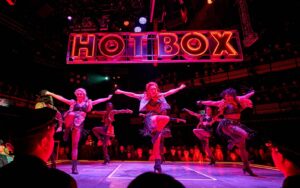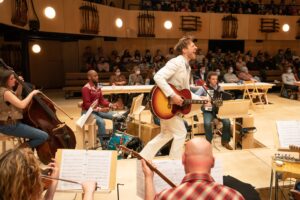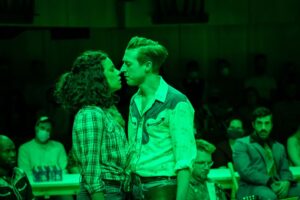Daniel Mays & Marisha Wallace lead an extraordinary theatrical experience
★★★★★

From the moment you walk into the auditorium at the Bridge Theatre and see the in-the-round arrangement, with half the audience milling about on the stage floor, neon lights hanging above them, you know this production of Guys And Dolls is going to be something special.
If you’re not familiar with Guys And Dolls, you might wonder what makes it for many people including myself the greatest musical. Of course, there are other candidates but it’s hard to find another that offers quite such riches. Thanks to Abe Burrows, and the source material by Damon Runyon, it has a clever, fast moving, romantic plot with witty, captivating dialogue. This is integrated with a packed score of classic songs by Frank Loesser from solos to duets to trios to ensembles, that set the mood, carry the story forward, and bring out all the complexities of the characters.
Until now, Richard Eyre‘s legendary National Theatre production of 1982 (for those of us that saw it) is probably the one every other production is judged by, but the Bridge Theatre‘s Nicholas Hytner has produced a rival.
The overture begins, the neon signs fly upwards, and risers appear out of the floor. Designer Bunny Christie has choreographed the rise and fall of numerous platforms across the whole of the stage area as beautifully as Arlene Phillips has the dancing. Working in the round is never easy for the lighting designer, but the stage, or stages are cleverly lit by Paule Constable so all is illuminated without the light getting in your eyes.
It took some time for my jaw to stop dropping, as the incredible front-of-house staff, many in police outfits, gently corralled the crowd out of the way of the many different interconnecting platforms going seamlessly up and down.
And that’s just the beginning of the way director Nicholas Hytner tackles the challenge of presenting a musical that, for all its qualities, is still riven with the sexism of the 1950s. By making a significant chunk of the audience part of the show, they (and by proxy those of us who were sitting) join the strange parallel universe of Runyonland, a world with stylised language, comic criminals, and binary guys and dolls. In this fantasy world, the men can all be gamblers and wastrels following Nathan Detroit’s floating crap game, and the women can all be Christian missionaries or strippers- the classic virgin or whore, until the happy ending brings us back to a more normal world, as if we have woken from a dream.
Then there’s the way Mr Hytner has cast the show. There are two love stories that give Guys And Dolls its momentum. For a bet, gambler Sky Masterston needs to seduce Sarah Brown, the buttoned-up leader of a Salvation Army-like mission. And Nathan Detroit needs to keep stringing along his hapless fiancée of 14 years, Miss Adelaide. In other words, the women are presented in the musical as the weaker sex. So, as if to make up for this, the production gives them the best and strongest voices in the show.
That’s no offence to Daniel Mays in the role of Nathan Detroit who has a decent singing voice. He sings his big duet Sue Me with great poignancy, but it is not challenging as a song, given that it was originally written for Sam Levine who was tone deaf. Andrew Richardson as Sky Masterson also sounds perfectly good but Celinde Schoenmaker as Sarah has a big lunged, high note hitting voice. And Marisha Wallace, who plays Miss Adelaide has a voice that could blow the roof off, and a personality to match. So while Miss Adelaide is a slave to her love for Nathan, in every other respect she comes across as a liberated, strong woman.
When Sarah and Adelaide sing the duet Marry The Man Today, they match one another note for note and provide one of the highlights of the show.
The rest of the cast are racially diverse, which is another way of pulling the musical into the present day.
The tone of the musical is set from the first number when out of the bustling crowd of actors and audience emerge a trio of petty criminals who sing Tinhorn Fugue, a song about betting on horses in which the actors sing different lyrics simultaneously to the same tune. The complexity of this circular canon delights and exhilarates, and sets us up for a musical which will continue to excite those emotions.
And what emotions they are. We’re quickly plunged into the first meeting between Sky and Sarah in which they sing the beautiful romantic song I’ll Know in which each describes their ideal lover.
The transformational power of love is the driving force of this musical, or, as the song puts it: ‘When you see a guy reach for stars in the sky,
you can bet that he’s doing it for some doll.’ In this production, the sexual side of love is accentuated. Miss Adelaide’s cabaret act is raunchier than I’ve ever seen it, especially when the Hot Box dancers give us a highly suggestive strip show to the tune of Take Back Your Mink; and in the Havana night club to which Sky takes Sarah, there is some very sensual dancing, at times between male couples (another nod to modernity).
Arlene Phillips’ dance routines are outstanding

And that trip to Havana is the point at which Sky and Sarah fall in love. Sarah, having got drunk, gets in a fight, then sings the stand-out song If I Were A Bell. Celinde Schoenmaker hits jaws and notes with equal force. For me, this was the best of legendary choreographer Arlene Phillips’ many outstanding dance routines, as Sarah leaps on and off lampposts and free falls into Sky’s arms. Both song and movement express the exuberance of falling in love.
Daniel Mays is peerlessBack to the floating crap game: before Andrew Richardson‘s slightly rumpled Sky Masterton sings a tense version of Luck, Be A Lady, Nathan Detroit is found squirming in the threatening presence of the gangster Big Jule, played by Cameron Johnson. While Daniel Mays is perfectly capable as a singer, as an actor he is peerless. Think Del Boy Trotter meets Arthur Daley and you get some idea of his realisation of a character who is both dominant to those below him and submissive to those above. Nathan may have a New York accent but in Daniel Mays’ hands he is straight out of the East End, titfer and all.
Then, as the gamblers assemble in the Mission Hall, we come to the moment we’ve all been waiting for: Sit Down, You’re Rocking The Boat, another fast, intoxicating song. It’s a classic 11 o’clock number (the name given to a showstopper that comes near the end of a musical), and Cedric Neal as Nicely-Nicely Johnson certainly does stop the show!
The song gets the many encores it deserves and the audience expects, not only for Mr Neal’s enthusiastic singing but also for the way the congregation sway in unison in their seats- yet another inventive dance sequence choreographed by Arlene Phillips. It’s a climactic moment that catapults us to the resolution of the plot.
But it ain’t over til it’s over. After the finale featuring the song Guys And Dolls, and the bows and the applause, the cast stay on the floor to dance with the audience, as the orchestra under the direction of Tom Brady plays us out.
If I have one reservation, it’s this. It’s inevitable that, with the risers going up and down, there is minimum scenery. No problem most of the time, but occasionally you may lose track of where we’re supposed to be.
One last thing. While the show is intended to be immersive and is aimed first and foremost at those standing on the floor, not everyone will want to stand and look up for over two hours. If you decide to buy a seat, the best in my opinion are in the centre of stalls rows BB and CC. In these seats, you will be level with the actors on the raised platforms, and feel close to the action. You will also be able to see the splendid orchestra on the opposite side of the auditorium at the back of the circle, and, as a bonus, you will have easy access to the onstage party at the end of the show.
Guys And Dolls is at The Bridge Theatre until 2 September 2023
Paul paid for his ticket
Click here to watch this review on our YouTube channel Theatre.Reviews With Paul Seven


